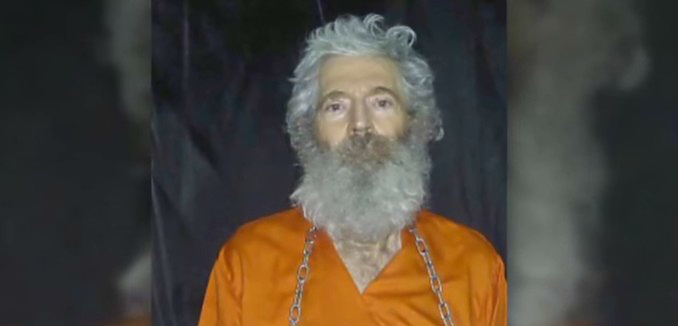The continued captivity of Robert Levinson nearly nine years after he was detained in Iran underscores the dangers foreigners face while visiting the Islamic Republic, Daniel Levinson, his son, wrote in an op-ed published Monday in The Washington Post.
Citing his father’s case, Levinson warned that in the wake of the nuclear deal, he “cannot emphasize enough how dangerous traveling to Iran remains” for Westerners.
It is widely known that my father, Robert Levinson, was detained on Iran’s Kish Island on March 9, 2007. Iranian state media even reported as much at the time, though Tehran now denies knowledge of his whereabouts. Iran is holding four other U.S. citizens, including Post reporter Jason Rezaian. It temporarily detained 15 members of the British navy two weeks after my father’s detention and several U.S. and European citizens in the years since. Any foreign national considering a trip to Iranian-controlled territory risks arbitrary detention, potentially without access to any basic human rights or their loved ones for years to come. This is what happened to my father.
My mother, my aunt and I went to Iran in late 2007 to retrace my father’s footsteps and meet with officials. We were treated well, and I was struck by the kindness of ordinary Iranians, their sympathy for our situation and the beauty of the country. I would love to return after my father’s case is resolved to see more of what Iran has to offer, but I couldn’t imagine doing so for “fun” anytime soon. We urge everyone to think twice before traveling there.
Levinson explained that his father had hoped to keep “an open line of communication between Washington and Tehran” in order to improve relations between the two governments. His family viewed President Barack Obama’s outreach to Iran optimistically, and believed that the nuclear deal could help secure his father’s release. They were “devastated” when they learned that the White House “squandered” its best opportunity to rescue Robert by not demanding that his release be included in the agreement.
While Levinson acknowledged that the power to release his father and other American hostages lies with Iranian Supreme Leader Ayatollah Ali Khamenei, he emphasized that American officials still “have a responsibility to take immediate action to bring them home.” He added that administration officials should not be celebrating the deal with Iran, as they did in October, as long as “[my] father and four other Americans are still there.”
“[My father] has languished in isolation for almost nine years, living a nightmare away from everyone he knows and loves,” Levinson concluded. “The United States cannot leave one of its own behind, especially after he has given so much to this country.”
The Washington Post, whose reporter Jason Rezaian was recently convicted and sentenced for espionage, has warned numerous times that Iran’s hostage-taking raises doubts about the regime’s trustworthiness and demonstrates a risk for anyone wishing to do business with the Islamic Republic. On Monday, an editorial in the Post blasted the administration for ignoring recent Iranian violations of United Nations resolutions and human rights, including hostage-taking. Since the nuclear deal was announced, one American citizen and another businessman with U.S. residency were arrested by Iran. They joined other U.S. citizens previously imprisoned by the regime, including Christian pastor Saeed Abedini and former Marine Amir Hekmati.
In Why Does Iran Keep Taking American Hostages?, which was published in the September 2015 issue of The Tower Magazine, Bridget Johnson wrote that the Obama administration’s indifference is partially responsible for the continued imprisonment of Rezaian and other Americans.
The unwillingness of the American government to stand up on behalf of the hostages is also a major problem. Michael Rubin echoes what many lawmakers have been saying: The administration “forfeited our leverage” on the hostages during the nuclear talks. “I can’t think of a time in another administration—Democratic or Republican—that has been so indifferent to the taking of American hostages,” he said. “What we should have been saying is, ‘We are not going to come to the table, we are not going to come into the same room with you if you’re holding American hostages.’ Now we have inflated the cost of the hostages by giving $100 billion for nothing. Iran isn’t into goodwill.”




